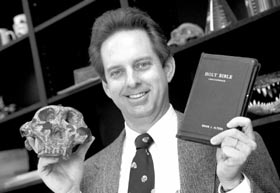
| ||
 | ||
 Professor Brian Alters PHOTO: OWEN EGAN |
The assault on evolution
|
DANIEL McCABE | When it comes to most of science, says Brian Alters, you'd be hard-pressed to find anyone who doesn't accept its basic precepts. Nobody is clamouring for the removal of the time-honoured equation of force equals mass times its acceleration from physics textbooks, for instance. No one raises a ruckus when students are taught the periodic table of elements in chemistry class.
But turn to biology, and you'll discover a very different situation. One of the concepts at the very root of biological sciences is the subject of constant attack, despite the fact that scientists are virtually unanimous in their support for the theory of evolution. And the opposition isn't restricted to a lunatic fringe. Notes Alters: "One out of two North Americans says evolution did not occur. They say the textbooks are wrong, the scientists are wrong, the teachers are wrong. We're talking about an overarching theme of the life sciences being widely rejected." The assault on evolution recently made headlines when the Kansas Board of Education decided to omit evolution from its statewide science curriculum. Professor Alters, the head of science education at McGill and an expert on the teaching of evolution, is hoping to do something to address the fact that evolution is under siege. He is the director of a new unit based at McGill called the Evolution Education Research Centre. The centre also includes four other McGill professors and four Harvard University professors. Among the prominent scholars recruited by Alters are paleontologist Robert Carroll, evolutionary biologist Graham Bell, philosophy of science expert Mario Bunge, educational psychologist Joyce Benenson and Harvard's Stephen Jay Gould, arguably the planet's best-known evolutionist. Alters says the centre's mission is fairly clear cut. "We want to examine what's going wrong in teaching and learning here. How can we help the education system change this?" Alters is currently one of only a handful of scholars doing research on the subject of evolution education. "It's incredibly under-researched. It's a very sensitive topic. A lot of people would rather not go into a field that upsets people as much as evolution. Religion enters into that, of course." Some of evolution's most strident opponents are fundamentalist Christians. As for Alters, "I like the controversy." An ex-cop, he doesn't scare easy. Not that he goes looking for a fight. Alters approaches evolution's critics respectfully and he doesn't make light of religious beliefs. "I ask [those who oppose evolution for religious reasons] if the Bible said the Earth was flat, would they believe that the Earth was flat? Usually, they say no, they would believe the Earth was spherical. They would regard the passage in a metaphysical or symbolic way." Alters says the time to come out swinging is when somebody misrepresents the scientific arguments for evolution. "When somebody says evolution can't be true because there are gaps in the fossil record, that's when you can bring out the facts. That's when I can turn to paleon-tologists like Bob Carroll and Stephen Jay Gould. Once the debate shifts to the evidence, the case for evolution is overwhelming." The people who don't believe in evolution, says Alters, don't understand evolution. For his part, Graham Bell believes the high school system is partly to blame for holding fast to a science curriculum that is "out of balance. "If you look at the high school curriculum, students have to take courses in calculus, physics and chemistry. They don't have to know anything about statistics or evolution. Students need two calculus courses to get into biology at the university level. Few will make use of it." When Bell talks to colleagues in his field in the U.S. about the Kansas decision, the consistent reaction is one of "embarrassment." Canada dodged a parallel experience thanks to its federal system, notes Bell. "There was a school board in B.C. where a similar sort of thing was going to happen, but the administration of education is a provincial responsibility." In the official proposal for the new centre, its proponents noted that the editor of the world's leading education journal of the life sciences (American Biology Teacher) contends that evolution "is by far the biggest failure of science education from top to bottom." Alters, who recently received a $650,000 grant from the Lucent Technologies Foundation to improve the teaching of science in primary and secondary schools, believes the McGill centre will be the first in the world devoted to evolution education. The centre recently received official approval from both Senate and the Board of Governors and is set to begin operations in January.
|
|
| |||||